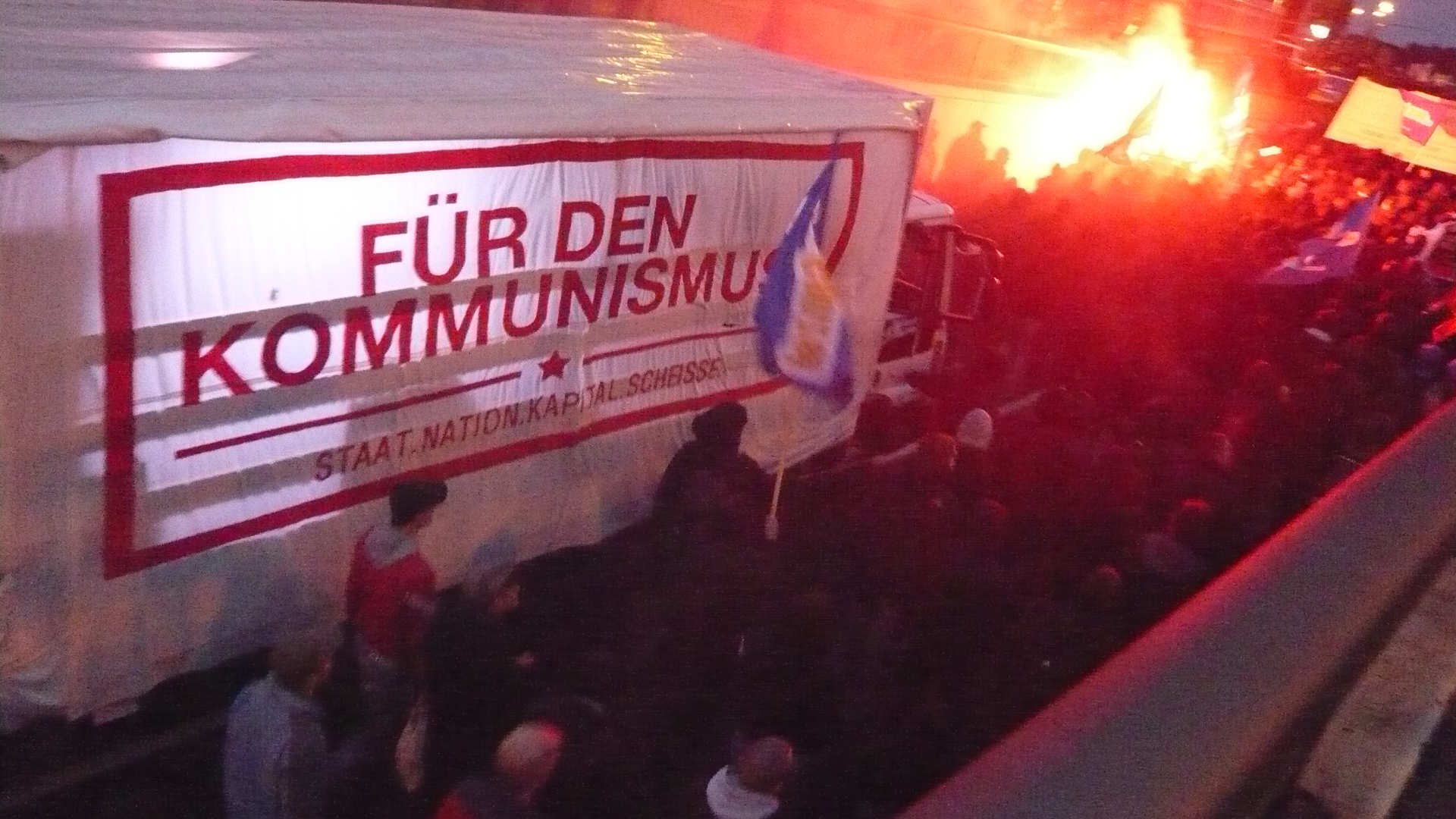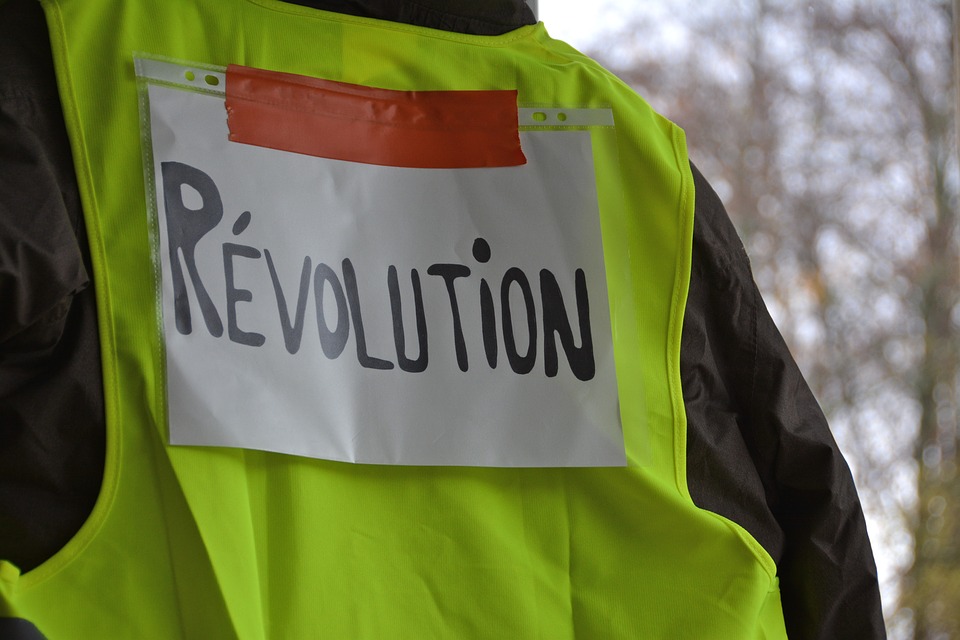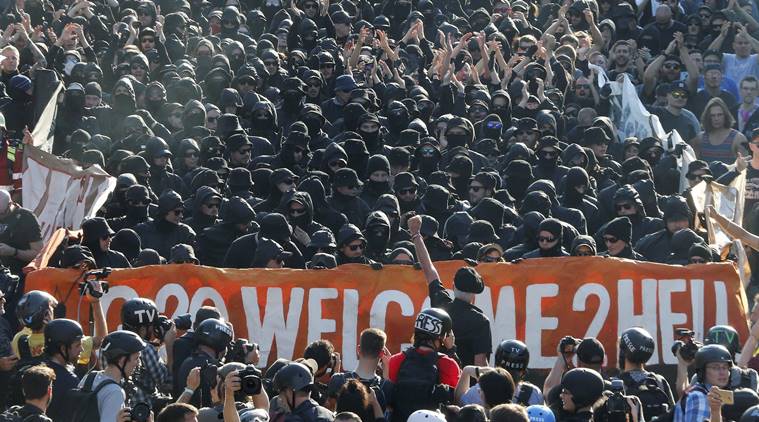Callum Cant, Plan C Brighton
…ums Ganze! are part of Beyond Europe, a European anti-authoritarian platform against Capitalism A PDF of State, Market and the Reign of False Freedom is available here.
Almost ten years into a still unresolved systemic crisis, two political tendencies now dominate in the UK. Social democracy and authoritarian nationalism have displaced diffuse social movements and liberal centrism as the antagonists of formal politics. This has confused some parts of the left with a historical opposition to social democracy, as they struggle to make sense of this latest turn. A renewed attention to the critique of the relationship between state, capital and citizen and the way in which that relation is expressed in the nation is the only way out of this problem – even as the very formation of the problem is in flux.
The two currently contending resolutions to the political and economic crisis facing us have radically different interpretations of how to intervene in the relationship between the state, the citizen, and capital. Should the state escalate its intervention into capital to increase the social wage and wealth redistribution towards citizens, or should the state double down on the perceived homogeneity of national community of citizens to protect against both the crisis tendencies introduced into social life by capital valorisation and the threat of the non-citizen? This is, fundamentally, the question of the general election. Both social democracy and authoritarian nationalism propose to make their interventions in order to produce a better nation as a result.
For those of us who have aspirations to solve the crisis by moving beyond the state, capital, citizenship and the resulting nation, there is an urgent need for answer to another question. What critique of that threefold relationship that produces the nation can we make in order to open up the possibility of a third answer, which is in fact a real movement of negation: communism?
The publication of a translation of State, World Market and the Reign of False Freedom from the German/Austrian organisation …ums Ganze! (loosely translated as ‘for everything’) is well timed to intervene in this question. Originally written in 2008, False Freedom gives an account of the relationship between state, capital and citizen, and how this relation expresses itself in the form of the nation, and, ultimately, fascism.
The crisis tendency inherent to capitalism, they begin, is both economic and political. The state is the political form which organises the political dimensions of capitalist crisis. The driving force of development which exacerbates capitalism’s crisis tendency is the compulsive force of capital expressed as competition, which refracts through the whole of society, from the scale of the world market to the scale of the individual. The state exists to maintain a universal law that can allow this compulsion free reign, whilst violently enforcing the social relations of private property that ensure the appropriation of its product.
This situation results in disempowered subjects, who have been forced into a war of all against all, within the rules of universal law and private property. In this context, freedom consists of the freedom to be exploited: “the political economy of bourgeois freedom thus systematically produces individual and social powerlessness. That is its self-contradiction” (30). This is why formal politics within this society cannot legislate over social production. “The limits of the political are already inherent in its capitalist form of determination. Only the campaigns which respect these limits have a chance for success; they must therefore participate in this reconciliation and productive management of competing positions of interest within the capitalist national economy. A politics which aims at the whole ensemble must at the same time be anti-politics, and attempt to pry open the constitutive constraints and predeterminations of the political form.” (35).
The authors propose that this situation did not arise by historical accident. Instead, the development of the capital-relation progressed through the co-creation of state and capital, and then the integration of elements of the working class into this state-capital complex as citizens. This nationalisation of the exploited subject serves to salve the wounds of constant competition, whilst at the same time objectively preventing class formation. “National identity is thus a general, objective form of thought of capitalist socialisation, a unified need born out of structural threats” (80). The citizen, therefore, becomes the third element of the relationship that produces the nation.
Any project that seeks to challenge the bourgeois-democratic form of socialisation has to understand theis integrity of the system as a whole. What initially appears as a more sensible approach – the bit-by-bit disintegration of bourgeois society – is in fact the least effective: “pragmatism and stupidity go hand-in-hand in the bourgeois world” (22). Any conflict with one element of this form of socialisation must necessarily include the others: conflict with the state entails capital and the citizen (understood as something apart from the working class), and visa versa.
The nation is ultimately a product of social relations which, when in crisis, develop towards fascism. Through this development, the citizen gains the ability to nullify themselves in order to escape the field of the political and merge into the pre-political unity of the ethnically homogenous nation. Security from the crisis tendencies of valorisation is made possible by a bad critique of capitalism, which embodies the pressure of competition in part of the population, which can then be isolated and destroyed. This process is one of fundamental continuity: “That national socialist ideology is based in capitalist competition and crisis also means that national socialism was not a ‘break in civilisation’, but rather an expression of the constitutive self-contradiction of bourgeois freedom which is also noticeable in civilised democratic everyday life. […] National socialism and fascism are not the complete other of bourgeois society, but rather one of this society’s ideological vanishing points.” (84-5). On the other hand, they conclude that the program of communism is the abolition of the (nation) state, (national) citizen and (national) capital, and the establishment of a society free of domination.
The inheritance of a value theory that emerged from the Neue Marx-Lektüre (NML) is clear throughout False Freedom. Again and again, the market emerges to define and direct social relations. This can be understood as the result of the contemporary inheritors of the NML like Michael Heinrich (who has an established dialogue with …ums Ganze!). The role of exchange, circulation and the world market is central to both their subjective and objective conceptions of the capitalist mode of production. This stands in tension with other elements of what we could broadly characterise as the autonomous Marxist tendency, which are more interested in reading struggle through the copernican inversion of Tronti, and who place the motor of capitalist development in conflict between classes rather than the coercive power of capital expressed through competition. This production/circulation tension clearly has implications in the analysis of the state, but remains beyond the scope of False Freedom.
So, to turn from False Freedom back to our moment, what kind of development does this allow in our theoretical and strategic analysis of the left populist turn to social democracy? Of course, there are many possible answers to this, but in particular I think it opens up potential discussions about the logic of communist intervention in the social democratic movement.
The demand placed on us by this situation is to accurately understand the role of the bourgeois state, to not resort to false ‘pragmatism’, nor to rely on gradualist top-down strategies – but also to have something more to say about this phenomena than mistrustful abstention. To me, there seem to be broadly three answers to this demand which have been widely adopted.
The first attempt at an answer begins with a subjective investigation into the political composition of the contemporary social democratic movements. Its logic goes something like this: if we want to understand this political generation that has developed from anti-austerity to the Labour party, we have to go where they are and have the same experiences. Canvassing, attending rallies, reading the same things – all serve to develop our understanding of what precisely the theory, praxis and desire of the Corbyn base are. Sergio Bologna, in his 1977 essay ‘The Tribe of Moles’, assesses the role of the Italian partisan movement in the emergence of militant organising at the point of production in the 1960s, and forty years after publication remains one of the best methodological examples of how such an investigation develops the analysis of the left. Whatever situation emerges post-election needs to be analysed and understood, and in order to do so, the argument goes, we need to understand the formation of the social democratic social bloc from the inside.
The second attempt at an answer attempts to extend the anti-political tendencies within left populism, in order to eventually challenge its political basis. Usually it starts from the idea that there is a necessary pivot point that results from a successful application of a populist social democracy. This point – the Oxi moment – comes when the movements below the elected representatives of social democracy demand something which it is beyond the capacity of the nation state to deliver, or when capital and the state launch an offensive against the social democratic elements embedded within them. When that happens, a direct power struggle is underway: either the state defeats the class or the class defeats the state. To talk specifically in the terms of False Freedom, it is in the turn to anti-politics where citizens break their own collective identity and become people engaged in a struggle against social domination. In situations like those in Greece we see very clearly that even with well-organised movements and an overwhelming mandate, social democracy doesn’t necessarily create the conditions for the ex-citizens to defeat the state – in fact, it often actively contributes to the opposite outcome.
This tendency has a few causes, but one of the most prominent is the fact that state-embedded party structures are generally resistant to the necessary turn to anti-politics. Their position ties them into a set of social relations with capital and citizenship which prevents them from placing all social production under direct working class control. This is partly why the social democratic project has so often matured into a failed project to capture state machinery, which at the same time forecloses a class project to destroy the objective basis of that state machinery. So, this attempt at an answer begins to prepare for this pivot point ahead of time, with the hope that the balance of forces at this point of fracture can be altered to the degree that a class project to destroy the threefold relationship between state, capital and citizen can be victorious. This means preparing an anti-politics within a politics, in the hope that a specific point of confrontation can be reached and then used to begin a class offensive.
Third and finally, we have the idea of ‘widening the Overton window’ and using social democracy as a vehicle to conduct mass political communication. Too often this approach relies on a vague sense of a unitary ‘left’ project that encompasses everything from an increase in the number of police officers and border guards to ‘fully automated luxury communism’, and sees (or at least, talks about) no potential interruptions or tensions between these positions. In doing so, it fails make a distinction between the class subject and the citizen subject within the social democratic movement. Propaganda from a communist perspective fails when it remains within politics. In a crisis situation, making arguments to cynically convince people of the validity of the objective basis of the nation is not only unlikely to reinforce our position, it has the capacity to do the opposite. Doubling down on a promised increase in police numbers in the wake of a terrorist attack, for example, commits social democracy to spending a huge part of a possible social wage on an investment in the paramilitary wing of the state – the exact same wing of the state that it’s base will inevitably be opposed if an ‘Oxi moment’ comes about. This amounts to active participation in the reconciliation of the crisis on the terms of the nation. The contradictions within this answer to the demands of the present are writ large. Anti-political mass communication within social democracy, on the other hand, does not present the same problems.
Trotskyist groupings are often the only ones engaging in Labour who continue to promote a kind of anti-political antagonism from within – a position which results from understanding themselves (following Lenin) as proletarian elements within a bourgeois party. Beyond that, the level of theoretical clarity within the wider communist left currently engaged in Labour seems to be lacking. Any forward movement from this point in the post-election period will not only necessitate a reappraisal of the balance of power on June 9th, but also a period of renewed critique of the relationship between state, capital, and class.





